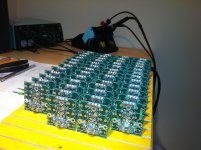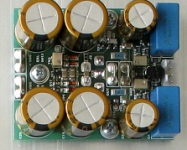Hi L.C.
I have been trying to contact you by mail, would be interested to buy one of your last stereo kits (nothing needs to be assembled)... shipping to Belgium. How do I best contact you?
Regards,
Berny
I have been trying to contact you by mail, would be interested to buy one of your last stereo kits (nothing needs to be assembled)... shipping to Belgium. How do I best contact you?
Regards,
Berny
This post for member "PMI" others to comment of course if any input, and is concerning his fluctuation/drift referenced in posts #2211 until 2221, and 2218, 2641, 2646, 2649, 2650, 2661, 2675. Hi Pete is it possible that the three screws going through the devices could be more or less magnetic dependant on manufacture brand. Could be tried with stainless stell or brass for non magnetic types. My thoughts are here that the electric field around the devices could easyer be transfered to board level components if magnetic ?
PS I stole this picture of your VSSA at the PeeCeeBee thread.
PS I stole this picture of your VSSA at the PeeCeeBee thread.
Attachments
I would not go as far as describing it as "drift", my heatsink is a bit oversized, and comes to temperature slowly. The screws are just plain steel, I don't have M3 stainless, but I could probably get some... the modules are back in the chassis, and listening to them as I type... maybe my fat fingers are just not well suited to tiny screwdrivers... 😀This post for member "PMI" others to comment of course if any input, and is concerning his fluctuation/drift referenced in posts #2211 until 2221, and 2218, 2641, 2646, 2649, 2650, 2661, 2675. Hi Pete is it possible that the three screws going through the devices could be more or less magnetic dependant on manufacture brand. Could be tried with stainless stell or brass for non magnetic types. My thoughts are here that the electric field around the devices could easyer be transfered to board level components if magnetic ?
PS I stole this picture of your VSSA at the PeeCeeBee thread.
I'm sure your fingers are doing well 😀 just saw your v3 PCB at that thread, very nice and now also blessed by Andrej, congratulation. If nonmagnetic screws are tried and gives any difference i guess you post result for us members to learn. Some inspiration for the thinking was the debugging from SHAAN against the metal piece around the input pair. Good weekend..... maybe my fat fingers are just not well suited to tiny screwdrivers... 😀
About magnetic effects, did some of you had an experience of any noticeable difference between magnetic sheet metal and aluminum chassis ?
Hi LC.
Any boards left. Need boards for a stereo system. Is that 1 or 2 of your PCB's???.
Will PM or email after confirmation of boards.
Thanks,
Myles
Any boards left. Need boards for a stereo system. Is that 1 or 2 of your PCB's???.
Will PM or email after confirmation of boards.
Thanks,
Myles
My thoughts are here that the electric field around the devices could easyer be transfered to board level components if magnetic ?
Uhm, no. Been watching too many sci-fi movies recently? 🙂
Yes, but not in this regard. Plain "mild" steel will interact with EMI (meaning "stray" magnetic fields), and can have a positive effect as shielding, and a negative effect as a conductor of EMI to places you don't want it. Fortunately, audio hides as many sins as it reveals...About magnetic effects, did some of you had an experience of any noticeable difference between magnetic sheet metal and aluminum chassis ?

Andrej and Shaan are, shall we say, very generous with their praise... 😀 (well, and you, of course). You might be less impressed if you knew how long it took to get it finished. However, I am happy with the results, so far.I'm sure your fingers are doing well 😀 just saw your v3 PCB at that thread, very nice and now also blessed by Andrej, congratulation. ...
Did-you refer to a personal study after extensive listening and measurements on this subject ?Uhm, no. Been watching too many sci-fi movies recently? 🙂
Or some other serious paper on this ?
I would be really interested to read-it.
Theoretically, distortion due to magnetic effects is well known. The question is, can we hear some of its effects due to chassis in a real build ?Yes, but not in this regard. Plain "mild" steel will interact with EMI (meaning "stray" magnetic fields), and can have a positive effect as shielding, and a negative effect as a conductor of EMI to places you don't want it. Fortunately, audio hides as many sins as it reveals...
(I have no personal experience on this, except with magnetic resistances/vs non magnetic ones)
Last edited:
Can's say, sorry. It is a good bet that what is well known to some people here, is not as obvious to me. (I probably mis-understood your post.)Did-you refer to a personal study after extensive listening and measurements on this subject ?
Or some other serious paper on this ?
I would be really interested to read-it.
Theoretically, distortion due to magnetic effects is well known. The question is, can we hear some of its effects due to chassis in a real build ?
(I have no personal experience on this, except with magnetic resistances/vs non magnetic ones)
Let's say I have "seen it" but not "heard it", and I found it interesting that emi can get on the DC grounds in this fashion. Therefore, I am speculating (not tested) that while a steel chassis may be better at shielding what is in it from external effects, it will definitely conduct the noise from a transformer or any kind of coil or loop, especially if the source is sitting on the bottom plate, as was demonstrated to me, even with what is now fairly old equipment.
No, the subject interest-me and i have no time to begin experiments to figure out both the physical effects (means measurements) and their subjective (Listening) consequences (if any) on sound-reproduction with real set-ups.I probably mis-understood your post
On the various aspects: EMi/RFI, shield efficiencies, distortions of audio signals
The first part of my answer was not addressed to you and your clever and prudent position. 🙂
Last edited:
Did-you refer to a personal study after extensive listening and measurements on this subject ?
I don't argue with the potential audibility of ferrous materials, just saying magnetic bolts cannot cause offset or bias problems - there is simply not enough gain in the circuit for this.
As for chassis material audibility - dunno, they all sound slightly different but i blame microphonics, not magnetism. Otoh, some people appear very sensitive to the sonic signature and related distortion of ferromagnetic parts such as resistor end caps.
Ah, ok, right. Dc or too low frequency.just saying magnetic bolts cannot cause offset or bias problems
sci-fi movies... You maybe right i can take a laugh on my behalf, but just try to find differences between delivered PCB's with different behavour. Here i am shure component precision and match value matter, but other than that looking for small things and that is why the shoot at post #2684. When ALF device is delivering 80W there must be different electro/electro magnetic fields in ALF's close area where screw sits, with magnetic or nonmagnetic screw and nut. Maybe nothing that matter for amp behavour or audio experience and second nothing to do with the calibration adjustment.Uhm, no. Been watching too many sci-fi movies recently? 🙂
Must back to movie
 , good weekend on
, good weekend on 
Hi LC,
Just confirming I sent my order yesterday to your personal email as requested.
Cheers
Derek.
Hi Derek
I didn't receive your e-mail message.
Please send your address info to:
esl@siol.net
Please do not forget to mention your forum name.
Regards, L.C.
Just resent order ...
Hi LC,
Just resent the order, to esl@siol.net.
Requested read receipt to be sure.
Cheers
Derek.
Hi LC,
Just resent the order, to esl@siol.net.
Requested read receipt to be sure.
Cheers
Derek.
Your email is bouncing....?!
This is the Postfix program at host cust-smtp-192.fasthosts.net.uk.
I'm sorry to have to inform you that the message returned below could not be delivered to one or more destinations.
For further assistance, please send mail to <postmaster>
If you do so, please include this problem report. You can delete your own text from the message returned below.
The Postfix program
<esl@siol.net>: host mailhub.siol.net[213.250.19.150] said: 554 5.5.1
<esl@siol.net>: Recipient address rejected: blocked using 2 dnsbls, INFO:
[rbl:uceprotect.rbl.siol.net:<IP 213.171.216.60 is UCEPROTECT-Level 1
listed. See http://www.uceprotect.net/rblcheck.php?ipr=213.171.216.60>;
rbl:ubl.rbl.siol.net:<http://www.lashback.com/support/UBLLookup.aspx?IP=213.171.216.60>]
(in reply to RCPT TO command)
This is the Postfix program at host cust-smtp-192.fasthosts.net.uk.
I'm sorry to have to inform you that the message returned below could not be delivered to one or more destinations.
For further assistance, please send mail to <postmaster>
If you do so, please include this problem report. You can delete your own text from the message returned below.
The Postfix program
<esl@siol.net>: host mailhub.siol.net[213.250.19.150] said: 554 5.5.1
<esl@siol.net>: Recipient address rejected: blocked using 2 dnsbls, INFO:
[rbl:uceprotect.rbl.siol.net:<IP 213.171.216.60 is UCEPROTECT-Level 1
listed. See http://www.uceprotect.net/rblcheck.php?ipr=213.171.216.60>;
rbl:ubl.rbl.siol.net:<http://www.lashback.com/support/UBLLookup.aspx?IP=213.171.216.60>]
(in reply to RCPT TO command)
- Home
- Vendor's Bazaar
- VSSA Lateral MosFet Amplifier



